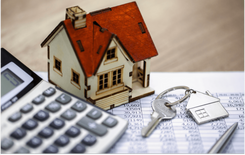How to Lock in a Mortgage Rate for New Construction in 2025


by Tyler Forte
When you put an offer on a home and move in a month later, you’re not worried about mortgage rates fluctuating. But when you’re building a new construction home, it may be months before you close on your house. You may see mortgage rates change drastically. How do you budget for this? What will your monthly mortgage payments be?
You can find peace of mind by getting a mortgage rate lock from your lender. We’ll walk you through the process and what you need to know.
But here’s the thing, the timelines on most mortgage rate locks are for short time frames. So we’ll guide you through the process of locking in a rate and how to do it with uncertain closing dates. Read on to find out more.
What Is A Mortgage Rate Lock?

A mortgage rate lock, or lock-in, means that your mortgage rate does not change from the time you sign the purchase agreement to the actual closing day when ownership is transferred. This is huge for the consumer because interest rates change daily.
It can be hard to determine the exact total you will pay each month for your home, and you want to make sure you have your budget in order before you sign on the dotted line.
How is a lock-in different from a mortgage pre-approval
Many people make the mistake of thinking that getting pre-approved for a mortgage is the same thing as getting a mortgage rate lock. This is not the case.
When you get a pre-approval letter from your mortgage lender, you will get a floating rate. This means you are pre-approved for a set amount of money with a floating interest rate. Your rate could change once the final closing happens.
You will most likely not see a mortgage rate lock until you sign a purchase agreement.
Why Do You Need A Mortgage Rate Lock?
Most homebuyers opt for a fixed-rate mortgage. The reason? With a fixed-rate mortgage, the interest rate will not change for the life of the real estate loan. This is a safe bet because you will have more predictable expenses each month. The alternative is an adjustable rate mortgage that can go up and down each month, which makes budgeting difficult because your monthly mortgage payment is never the same.
You want to have the assurance that you won’t have higher rates before you close on your house, and the mortgage lock-in provides this.
Why do mortgage rates change?

There are a variety of reasons mortgage rates can change. Some factors have to do with your personal financial history, like your credit score. But some factors are entirely out of your control and have to do with the economy, so things like inflation and job growth can affect market rates.
It’s essential to shop around and find the best fixed-rate mortgage for your financial situation.
How much can you save by locking in a mortgage rate?
It depends. In our “Disadvantage of a Mortgage Rate Lock” section, we'll go into this more below. But you’re not always guaranteed to save money with a mortgage rate lock. That’s because mortgage rates could go up or down.
But let’s look at a scenario where you can save money with a mortgage rate lock. In this example, you’re getting a mortgage for $300,000:
- At a mortgage rate of 3.1%, you will pay $161,177.71 in interest for a thirty-year loan.
- But say you never secured a lock-in for your rate before closing. Your mortgage rate goes up to 3.3%. Your total interest payment over thirty years is now $172,991.63.
You could have saved $11,813.92 by getting a rate lock. This can really add up on a monthly payment. You also won’t have to pay extra for refinancing once you’re homeowners. (Many people have to refinance to get lower interest rates.)
How Long Does A Typical Mortgage Rate Lock Last?

Most mortgage rate locks last between 30- 90 days. But borrowers can get some mortgage lenders to go a little higher with a lock-in rate of 120 days. Lock-in rates will vary based on the mortgage loan type, amount, and mortgage lender. It’s always worth asking your mortgage lender what your options are for a rate lock.
Does It Cost Anything To Secure A Mortgage Rate?
Mortgage rate locks come with fees. The first is the initial rate lock fee. This is usually a fee charged upfront to secure your mortgage rate. You can pay this fee out of pocket or roll it into your overall mortgage.
Next up, if you have to go beyond the typical mortgage rate lock period (usually over 90 days), you will have to pay a mortgage rate lock extension fee. Most lenders charge this fee as a percentage of the loan amount.
When Should You Get A Mortgage Rate Lock If You’re Buying A New Construction Home?

Every situation is different. If your new construction house is already built, opt for a 30-day mortgage rate lock after signing a purchase agreement. This should get you to your closing date.
But if your house isn’t done yet, you may have to consider your options carefully. Consult your builder about your closing date, and check reviews about how well they keep to their timelines. If you feel confident about the timeline, then talk with your lender about costs associated with different rate lock options with different timeframes. Compare the difference between a longer rate lock and a shorter rate lock with extension fees.
The timing can be so tricky when building a new home. The key is to make sure you have options for a variety of scenarios.
New construction mortgage rate lock vs. existing pre-owned house
The biggest issue you will face with a mortgage rate lock for your new construction is locking in a rate with uncertain closing dates. This the case for people buying existing pre-owned houses. There is a definite closing date for a pre-owned house, and you can easily find the right mortgage rate lock to fit this date. Most thirty-day rate locks will work.
How To Lock In A Mortgage Rate When Buying A New Construction
Most people are primarily concerned about the timeline of mortgage rate locks. But knowing the process of locking in your rate can help you formulate a timeline that works for you. Here’s the process if you’re building new construction, but the process is similar for any house.
Step 1: Talk to your builder about closing dates
The biggest issue that you will run into with mortgage rate locks and new construction houses is the timeline. It can feel impossible to nail down an official closing date when so many factors exist for building a new home.
But your builder should be able to provide an accurate date range for closing. Be sure to select a reputable builder that is known for keeping deadlines.
Step 2: Discuss time frames and costs with different lenders
It’s completely normal to shop around for a mortgage. You want to get the best rate.
But if a mortgage rate lock is a priority, you need to include this in your discussion as you talk to lenders. Go over different timelines and costs associated with a mortgage rate lock. If the mortgage rate lock timeline is too short, ask about extended rate locks and fees. Ask the lender if they have float down options if mortgage rates drop.
Weigh the pros and cons of each lender's different fees and timelines. See what makes the most sense.
Step 3: Decide on your mortgage lock date
Once you have nailed down your preferred lender, it’s time to have a mortgage lock date marked on your calendar. Pick a date near your closing date, and ideally, it will be a little after to provide a buffer. You don’t have to lock in on a rate on this exact date. But it will give you an idea.
Step 4: Watch mortgage rates
Start watching the mortgage rate when it gets close to your ideal date. Your lender and Realtor can give you insight, but the ultimate decision to make the call will be yours.
Most people will opt for a mortgage rate lock when rates start to rise, and they will hold off while mortgage rates decline.
Step 5: Get your interest rate lock
Make the call to get your rate locked, and protect yourself from the risk of rising rates. You will need to provide a timeline for your rate lock as well.
Step 6: Experience a smoother closing day
You don’t want any surprises on closing day. (You already have a lot on your plate with paying the down payment.) A mortgage rate lock will help get you to closing day with a more predictable mortgage. Many of the fees can be rolled into the closing costs.
Do You Have To Commit To A Lender If You Get A Mortgage Rate Lock?
If you want to keep your mortgage rate locked with the lender, you will have to stay with them and their financing offer. However, there may be a situation where you want to jump ship with your current pre-approved financing option before closing.
What if mortgage rates go down while you have your rate lock?
The biggest reason that homebuyers switch lenders before closing is that mortgage rates go down, and the rate lock is no longer advantageous for them. You can shop around for a new mortgage if that’s the case. But keep in mind that this might cause delays in closing, which could create other disadvantages.
If you’re in this boat, there are a few options before starting over with a new lender. First, getting on the phone with your loan officer may be worth it. It doesn’t hurt to talk through your options. If the mortgage company has already put in the time to prepare your mortgage, then it’s in their best interest to keep you. They may even discuss a float-down option, which we’ll dive into below.
Float down option
If getting lower rates is important to you, having a float-down option may be the right step. This contingency in your loan agreement lets you drop your rate down if mortgage rates drop before closing on your house.
The float-down option has its pros and cons. You usually have to pay a fee to add this stipulation to your loan application. But the upside is that it gives you the peace of mind the get the best possible mortgage rate up until your closing day.
Questions To Ask Your Lender Before Getting A Mortgage Rate Lock

Every lender is different. It is worthwhile to talk about mortgage rate locks before proceeding with a loan application. Here are some good questions to ask to get your discussion rolling:
- How does your financial institution define a mortgage rate lock? What is the benefit of doing it today?
- What lock-in timeframe does this loan estimate include?
- Are there different timeframes available? What are the differences in costs?
- What happens if my closing is delayed? I’m building a new house.
- If interest rates go down, what are my options?
- Is there differences in lock programs for new construction loans?
- Are rate locks different for FHA loans or first time home buyers?
One of the best things you can do during the lending process is to ask questions—advocate for yourself. You don’t have to decide on the same day. Also, consider asking your builder follow-up questions about your closing day and potential delays.
What Do I Do If My Mortgage Rate Expires Before My New Construction House Is Completed?
This is the biggest worry when financing a new construction house. Your rate lock runs out before you close. With all of the delays happening with construction nowadays, this is a real possibility to anticipate. Here are a few things to do to plan for the unexpected.
Pick an ideal moment to lock in a mortgage rate
You don’t necessarily have to secure a mortgage rate lock as soon as you sign a purchase agreement. Instead, wait for the moment when you have a clearer closing date and rates are most advantageous.
If you’re worried about pulling the trigger on your rate lock at the right moment, then don’t forget to get a float-down option. This will allow you to get the lowest possible rate during your mortgage rate lock period.
Get an extended rate lock
You can pay an additional feed to receive an extended rate lock. Ask your lender if they offer this option. Extended rate locks are perfect for new construction homes with uncertain finish times. You can pay additional fees to keep your rate locked in before closing. Usually, the longer extension translates to a higher fee. But that fee can help you have more peace of mind during the build.
Pay an extension fee
If your closing date gets pushed back a week or two and your rate lock is about to expire, you can usually pay an extension fee. An extension fee keeps your mortgage rate locked in for a short period of time. You can buy time with a mortgage rate lock extension fee.
Look into different financing
At the end of the day, you don’t have to commit to any mortgage until closing day. If you’re not getting good rates from your lender, then walk away. A mortgage is a long-term commitment, and you need to feel right about the terms.
This option does have the potential of delaying the closing. Additionally, your lender won’t want you to back out after they have already put work into preparing the home loan. So it is worth discussing your options before backing out of your existing loan before closing.
About Felix Homes
Felix Homes is where five-star service meets low commissions! To date, we've saved our clients $1,610,738 in commission fees and have earned 120 five-star reviews on Google!
How are we able to offer five-star service AND lower commission fees? It's simple:
- We're an independently owned brokerage – not a franchise which allows us to keep more of the commission we earn.
- By offering a lower commission, more folks want to work with us which means we close more deals. By closing more deals, we can pass more savings along to our customers!
Still not convinced? Read all about our low-commission mission here.
If you have any questions about the state of the market or the home buying/selling process, please feel free to contact us at contact@felixhomes.com or 615-354-5731.




